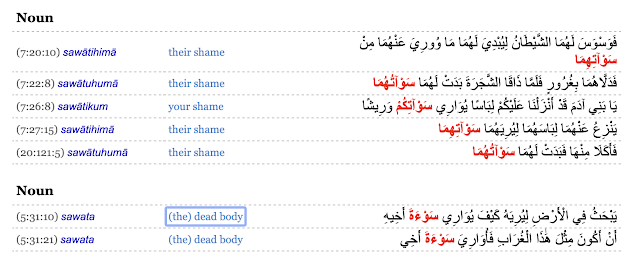Revisiting Human: Body or Soul? Part III: Body / بَدَنِ / جَسَدًا / سَوْءَةَ
Note: In 2017, I published a post titled Human: Body or Soul?. In this series, I intend to restudy the ayaat to improve the understanding, and to increase in submission, in sha Allah
DRAFT
The Quran speaks of the body in three different root words.
سَوْءَةَ
In Adam's story, and his sons, it speaks of the body in the triliteral root sīn wāw hamza (س و أ):
- in Adam's story, when Iblis (Satan) tricks them into losing their clothing, their naked body is described with the word سَوْآتِهِمَا , as described in detail in Surah al-Araf (Q7:20, Q7:22, Q7:26, Q7:27).
- in Adam's sons' story, the dead body is described as سَوْءَةَ .
This triliteral root س و أ shares meanings with words which indicate the consequences of our (sinful) deeds upon us, such that they are a physical consequence, which needs to be removed, and is removable. For example:
وَالَّذِيۡنَ اٰمَنُوۡا وَعَمِلُوا الصّٰلِحٰتِ وَاٰمَنُوۡا بِمَا نُزِّلَ عَلٰى مُحَمَّدٍ وَّهُوَ الۡحَقُّ مِنۡ رَّبِّهِمۡۙ كَفَّرَ عَنۡهُمۡ سَيِّاٰتِهِمۡ وَاَصۡلَحَ بَالَهُمۡ
And those who believe and do righteous deeds and believe in what has been sent down upon Muḥammad - and it is the truth from their Lord - He will remove from them their misdeeds and amend their condition.
[Al-Quran 47:2, Translation: Saheeh International]
لِّيُدۡخِلَ الۡمُؤۡمِنِيۡنَ وَالۡمُؤۡمِنٰتِ جَنّٰتٍ تَجۡرِىۡ مِنۡ تَحۡتِهَا الۡاَنۡهٰرُ خٰلِدِيۡنَ فِيۡهَا وَيُكَفِّرَ عَنۡهُمۡ سَيِّاٰتِهِمۡؕ وَكَانَ ذٰ لِكَ عِنۡدَ اللّٰهِ فَوۡزًا عَظِيۡمًا ۙ
[And] that He may admit the believing men and the believing women to gardens beneath which rivers flow to abide therein eternally and remove from them their misdeeds - and ever is that, in the sight of Allāh, a great attainment
[Al-Quran 48:5, Translation: Saheeh International]
.........................................................
جَسَدًا
- an image of a body, as of the heifer (عِجْلًا) that the Bani Israel started worshipping, as in Q7:148, and Q20:88,
- or a body which doesn't need to eat, nor does it die, as questions Q21:8,
- or maybe a body, or image of a body, that Solomon was tested with, and then he realised his sin, and repented, as in Q38:34
.........................................................
بَدَنِ
Traditionally, when the Pharaohs died, they were mummified and their bodies preserved. There are many such mummies. However, this was a unique case where an entire army was drowned, and it must have been a long while before this drowned, wet yet preserved, body was discovered and taken care of.
The entire ayat reads:
فَالۡيَوۡمَ نُـنَجِّيۡكَ بِبَدَنِكَ لِتَكُوۡنَ لِمَنۡ خَلۡفَكَ اٰيَةً ؕ وَاِنَّ كَثِيۡرًا مِّنَ النَّاسِ عَنۡ اٰيٰتِنَا لَغٰفِلُوۡنَ
However today We will preserve you in your body so you may be a sign to anyone who comes after you. Yet many people are quite heedless of Our signs.
[Al-Quran 10:92, Translation: T. B. Irving]
.........................................................
So, the three different words for body might mean three different aspects:
- suffered some harm سَوْءَةَ
- shape of the body جَسَدًا
- content of the body بَدَنِ
Looking up in Lane's Lexicon:
- بَدَنِ indicates fatness and age, or the torso, i.e. the trunk of the body, considered independently of the head, hands and feet
- جَسَدًا indicates a soulless body
- سَوْءَةَ a thing became evil or bad; or something that causes grief or shame; or something unsightly when exposed, more specifically the exposure of the pudendum
.........................................................
From the original post:
Last updated on: November 24, 2022






No comments:
Post a Comment